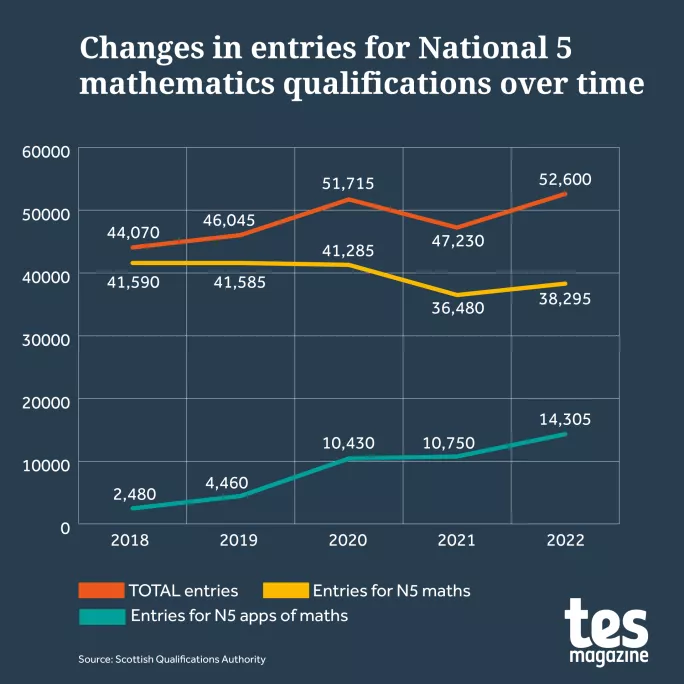Is this how to make maths more appealing to teenagers?

Has Scotland come up with an ingenious way of convincing more teenagers to study maths?
Maths has a reputation as a tough subject that people either have an innate ability to do - or not. In Scotland, there has been a push to change attitudes and to convince everyone that they can be proficient in maths.
Initiatives such as Maths Week Scotland - which was introduced in 2017 - have had some success when it comes to generating excitement and enthusiasm for the subject.
Even so, a piece of research conducted in May this year found that “maths anxiety remains an issue”. Of the almost 6,500 primary and secondary students surveyed, 45 per cent said they felt nervous or anxious about maths and 38 per cent said they felt more nervous about maths than any other subject.
When students begin to take subject qualifications in secondary school, maths remains the second-most popular subject after English - but in 2022, 16 per cent of students entered for N5 maths failed the qualification, compared to just 4 per cent of those who sat English.
However, there is now a suggestion that perhaps some students have been doing the wrong kind of maths and optimism among Scottish educators that a new qualification, “applications of mathematics”, could result in far more students seeing the relevance of the subject - and, crucially, sticking with it to a more advanced level.
- Listen: What’s the best way to teach early numeracy?
- Tes’ 10 questions with... Award-winning maths teacher Chris Smith
- The four capacities: what should be done about them?
It should be noted, though, that other parts of the UK have already gone down this road, and may even be thinking of performing a U-turn. Wales is looking at how it might change its GCSE qualifications to chime with the new curriculum, and one of the proposals is to create a new combined GCSE maths and numeracy qualification to replace the two existing GCSEs in maths and “mathematics-numeracy”.
The rationale for the change is that there is “significant overlap” between the two qualifications and “an artificial divide” was created when two separate approaches were introduced in 2015.

Scotland’s enthusiasm for the change, however, is such that there is even some suggestion that, ultimately, applications of mathematics - with its focus on applying maths in real-life situations - could become more popular than the main maths qualification, because of its relevance to everyday life and modern citizenship.
Others, though - while supportive of the new qualification - believe maths is in need of a more extensive overhaul and are pinning their hopes on what the ongoing independent review of assessment and qualifications could deliver.
Applications of maths ‘still quite tricky’
The National 5 applications of mathematics qualification was launched in 2017-18. It replaced the old “lifeskills mathematics” qualification that teachers say had an image problem, because it was considered to be “dumbed down”.
The change was more of a rebranding exercise than an overhaul of the qualification. The name of the qualification was changed and the exam was tweaked to make it less wordy, and to remove any unintended literacy hurdles - but the course content remained the same, with learners taught how to apply maths skills and techniques in everyday situations.
For instance, the 2022 exam asked learners to calculate Farah’s net pay based on how long she had worked, how much overtime she had done and the amount of income tax, national insurance and pension contributions she had paid. Students sitting the exam also had to calculate the probability of winning a prize at a Christmas coffee morning and work out if a fundraising event achieved its goal of raising £2,000.
Entries for N5 applications of mathematics have risen sharply, from around 2,500 in 2018 to over 14,000 in 2022. And, for the first time in 2022, students were able to sit Higher applications of mathematics, for which there were 870 entries (compared with more than 18,000 entries for Higher mathematics).
Total entries for maths qualifications at N5 have therefore gone from just over 44,000 in 2018 to 52,600 last year - an increase of around 20 per cent when student numbers in the senior phase of secondary were rising, but only by around 8 per cent.

There is a caveat, however. The big rise in numbers sitting applications of mathematics at N5 is partly down to high-attaining students being presented for both it and the main maths qualification, given the crossover between them, which allows schools to secure a “decent improvement in N5 performance with very little effort”, as one maths teacher put it. Last year, 28 per cent of candidates were entered for both National 5 maths and National 5 applications of maths.
But as well as bagging high achievers a bonus National 5, there is confidence that the new qualification is also resulting in other students - who would be less likely to pass N5 maths - securing a maths qualification at that level.
Pete Duncan is principal teacher of curriculum for maths at West Lothian secondary school Deans Community High, in Livingston. He has been using N5 applications of maths as a back-up option for students struggling with N5 maths. He moves them to an applications of maths pathway in October of the S4 year.
Last year, 42 S4 students, who would otherwise have been National 4 passes, switched to the N5 applications of maths course. Ultimately, 15 got A-C passes and another 10 got Ds.
Supporters of the new qualification rail against any suggestion it is easier - as does Duncan. His take is that it isn’t so much that applications of mathematics is easy, but that N5 mathematics is “by far the most difficult N5”.
He describes the N5 applications of mathematics question paper as “still quite tricky” but says it is an “appealing course” because it allows students who struggle with algebra and trigonometry to avoid those aspects of maths.
Sue Pope is head of science, mathematics and core skills at the Scottish Qualifications Authority (SQA). She insists applications of maths is “a different flavour of mathematics” but that the standard is the same - and that, if anything, the literacy demands it puts on learners are actually greater, because problems are contextualised and need to be read carefully in order to be answered.
However, it is the new Higher in applications of maths that she is really excited about. Unlike at N5, she says, a Higher maths candidate “wouldn’t stand a chance” in the applications of maths exam unless they had studied the course, because there simply is not enough crossover.
‘Students can see how it applies to real-life issues - things like climate change and social justice’
For example, Higher applications of maths candidates have to have access to a computer in the exam so they can work with spreadsheets and statistical software; there is also a project that counts for 27 per cent of the final mark.
In maths, in stark contrast, there is no coursework and grades are entirely dependent on the end-of-year exam. At Higher, the only other subjects with no coursework element are Latin and philosophy (although it should be noted that as a result of the pandemic, many subjects had coursework removed or slimmed down in a bid to free up teaching time and mitigate Covid disruption).
Pope says Higher mathematics is a well-regarded, well-respected qualification, which is “brilliant for the Stem pipeline” so that students are prepared to enter the fields of science, technology, engineering and mathematics. However, she believes that applications of mathematics will open up “far more opportunities for far more young people to continue studying mathematics at [Higher level]”, not least because they will more easily see the relevance of learning “essential skills for modern citizenship” such as mathematical problem solving, financial modelling, statistical modelling, understanding quantitative information and being able to use spreadsheets “to model and manipulate”.
She says feedback from teachers shows that, when it comes to applications of mathematics, learners are less likely to ask “what’s the point of this?”.
“There are many learners in school who say ‘what is the point of learning algebra?’ but actually that’s not the case in this course,” says Pope.
“Students are really seeing the relevance of what they are doing. They can see how it applies to real-life issues - things like climate change, social justice - all the things that many young people are very concerned about. This new course gives you the tools to be able to engage with quantitative information.”

Pope points out that, every year, around one in four students sitting Higher maths fails to get an A-C grade. That, she says, could be because of bad luck on the day of the exam - but it could also be because “they may not be doing the right kind of mathematics”.
She even suggests that applications of maths could eventually become the more popular qualification.
Maureen McKenna - the former director of education at Glasgow City Council who began her career as a maths teacher - is also enthusiastic about the qualification. McKenna was the chair of the Making Maths Count group set up to investigate how Scotland might begin to change attitudes to maths. It was as a result of that group’s final report and recommendations in 2016 that Maths Week Scotland - the annual celebration of the importance of maths - came into being.
McKenna says there is hardly any learning about statistics in N5 maths, but that applications of maths plugs that gap.
“Everybody should have statistics somewhere - they should have an understanding of it. Covid is a really good example. Every night on the news we got all that data, all those graphs, people needed to understand because their lives were directly affected by what that data was telling them.”
The qualification also chimes with a key recommendation in the Making Maths Count report that the importance of maths to everyday life and future jobs should be made clearer to students.
However, McKenna’s ambitions for changes to maths as a subject extend well beyond a new qualification. She is hopeful that the ongoing review of assessment and qualifications being led by Professor Louise Hayward will bring wholesale changes to the way the subject is assessed.
‘Not everybody needs that pure maths route’
Before the pandemic, around 75 per cent of students consistently achieved an A-C pass at Higher maths and around 65 per cent attained an A-C at N5. Then that changed. In 2020 and 2021, when teachers were responsible for assessing students, the Higher maths A-C pass rate rose to over 80 per cent and the N5 pass rate to over 70 per cent.
Unlike some, McKenna does not dismiss this as teachers being overly generous in their grading. Rather, she argues that teachers really know their students and we should question “why do we put everything on that one day in May?”
She suggests one potential future model could be that maths qualifications are broken down into units so if a student fails the exam they still pass the units. Scotland has a rocky history with units, however. Unit assessments taken over the course of the school year were part of the new school qualifications that were introduced to align with Scotland’s Curriculum for Excellence, and its ambition to shape an education system less reliant on high-stakes exams. But the Scottish government decided in 2016 to scrap unit assessments after they were blamed for excessive testing of students and fuelling teacher workload.
Ultimately, the best way to assess what students know and can do is going to be a problem Scotland is grappling with for some time to come; one of the first staging posts on that journey will be the publication of Hayward’s interim report in December.
For the time being, however, Scotland has a new maths qualification that could improve mathematical literacy and may well be worth holding on to in some form - because, as McKenna says, “not everybody needs that pure maths route”.
Emma Seith is a senior reporter at Tes Scotland. She tweets @Emma_Seith
You need a Tes subscription to read this article
Subscribe now to read this article and get other subscriber-only content:
- Unlimited access to all Tes magazine content
- Exclusive subscriber-only stories
- Award-winning email newsletters
Already a subscriber? Log in
You need a subscription to read this article
Subscribe now to read this article and get other subscriber-only content, including:
- Unlimited access to all Tes magazine content
- Exclusive subscriber-only stories
- Award-winning email newsletters
topics in this article



